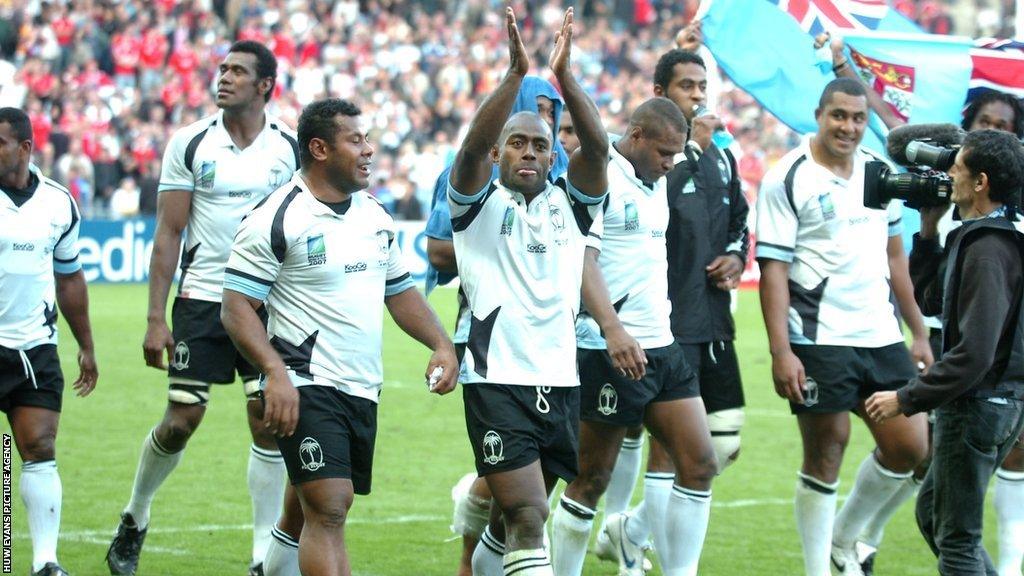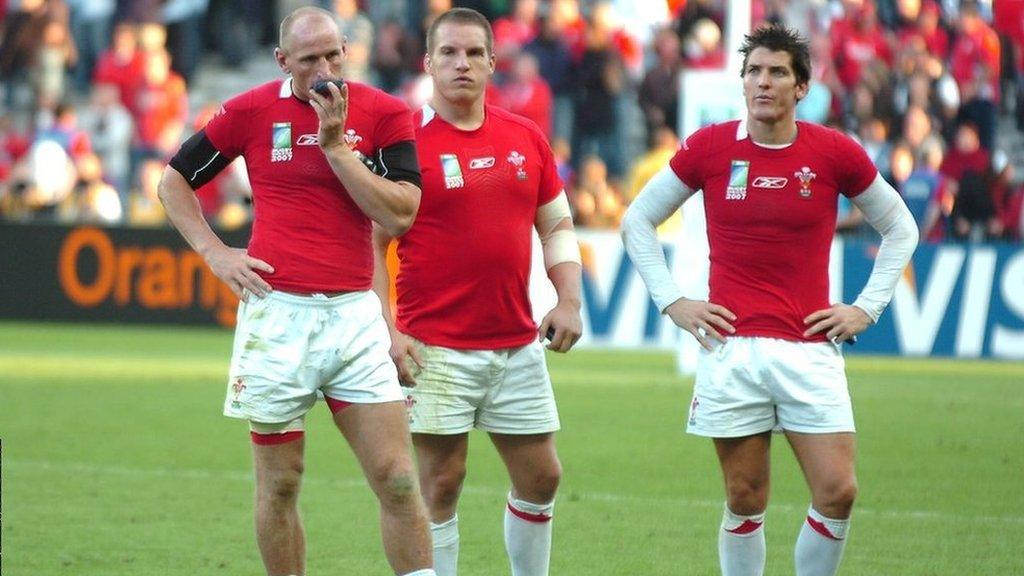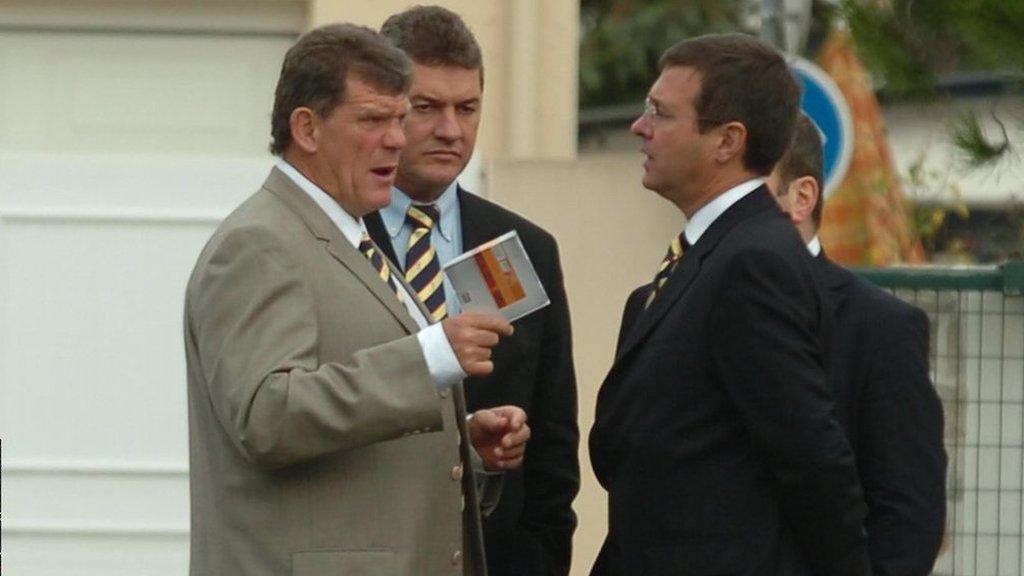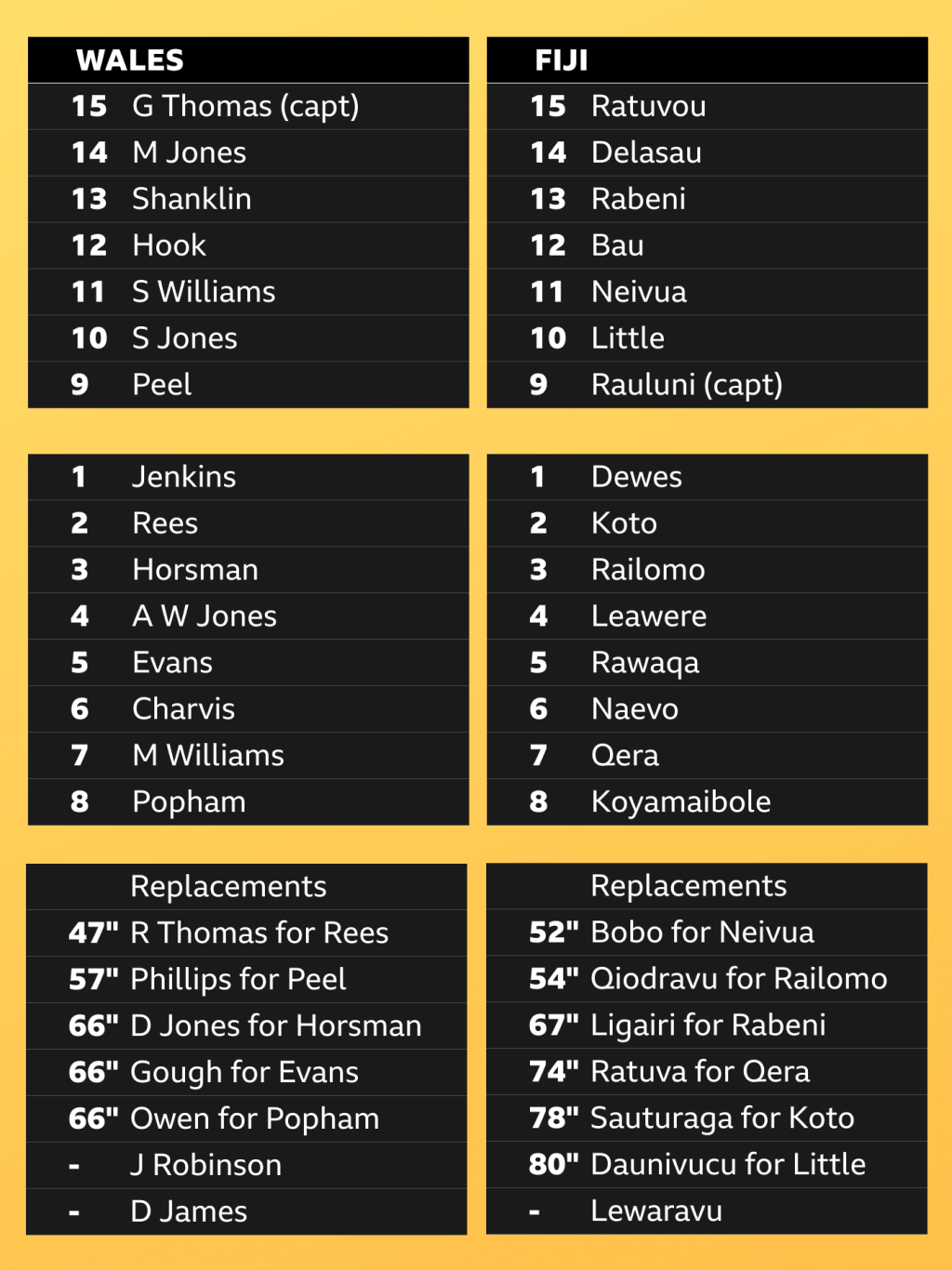Rugby World Cup: When Fiji inflicted a Nantes nightmare on Wales
- Published

It was Fiji's first win in nine games against Wales and saw them advance to their first quarter-final since 1987
World Cup 2007: Fiji v Wales |
|---|
Wales (10) 34 |
Tries: Popham, S Williams, G Thomas, M Jones, M Williams Cons: Hook, S Jones (2) Pens: S Jones. |
Fiji (25) 38 |
Tries: Qera, Delasau, Leawere, Dewes Cons: Little (3) Pens: Little (4) |
The Nantes nightmare of 2007 is ingrained in the World Cup history of Wales rugby.
As BBC Sport Wales commentator Gareth Rhys Owen described the extraordinary events in a special Scrum V podcast, mention the words Fiji, France and the World Cup to a Welsh rugby supporter and they will be transported back to a September horror show of 16 years ago.
Wales' loss that day signalled the end of Gareth Jenkins' time as Wales coach, which in turn led to the arrival of Warren Gatland.
The New Zealander's first 12-year stint in charge saw Wales reach two World Cup semi-finals and one quarter-final.
Now we have come full circle, with Gatland preparing the Wales class of 2023 to face Fiji in the World Cup again.
The venue is different, with Bordeaux replacing Nantes, and the Fijians being Wales' first group opponents - on 10 September - rather than their last.
Gatland and his squad must hope the Nantes nightmare of 2007 will not be repeated.

Winner takes all

Wales players line up before the Fiji haka
Wales had a troubled World Cup build-up, with only a win on the final weekend of the 2007 Six Nations against England in Cardiff ensuring they avoided a clean sweep of defeats in the tournament.
That was followed by a record 62-5 defeat against England at Twickenham in a World Cup warm-up game.
Fiji had lost their coach eight months before the tournament, with Wayne Pivac quitting citing family reasons and replaced by Ilivasi Tabua.
Wales started the competition in Nantes with an unconvincing 42-17 win against Canada before returning to Cardiff to suffer a 32-20 defeat to Australia which was followed by a 72-18 defeat of Japan.
Fiji had also beaten Canada and Japan and lost to Australia, meaning they faced Wales with a quarter-final in Marseille awaiting the victor. The loser would be going home.
So did Wales underestimate their opponents?
"Hand on my heart, we expected to win," said Wales lock Ian Gough.
"All the itineraries for the next day were travelling down to Marseille to face South Africa in the knockout stages and everybody took their eyes off the prize and took Fiji for granted."
Wales centre Tom Shanklin added: "We had Fiji up last which we weren't thinking massively about because it was Fiji. We'd played them plenty of times in the past and we underestimated them.
"We didn't take it as seriously as we should have, so we have to shoulder a lot of the responsibility. It was a game we should have won but took too lightly."
Attack coach Nigel Davies insists Fiji were respected.
"We'd watched Fiji grow as a team through the early stages of the World Cup," he said.
"The more time they had together the better they were becoming and that was something we were aware of."
Scrum-half Moses Rauluni captained Fiji that day.
"The tournament was mixed emotions because we almost lost to Japan and played poorly against Canada and I was wondering how we were going to compete with Wales and Australia," said Rauluni.
"We picked our second side for the Australia match and let that game slide. Our main focus was Wales. That was our final.
"We were confident because two years before we had come to the Millennium Stadium and only lost 11-10.
"That day, it was like the old Fijian side where we would die in the last 20 minutes. We made a pact within the team, especially the senior players, we would be the fittest players that left these shores in 2007."

Storming start

Wales players had two games in Nantes and two games in Cardiff during the 2007 World Cup
Wales started more brightly as Stephen Jones put Wales ahead with a penalty as his side dominated the opening exchanges.
Then came the Fijian flurry as they responded with tries from Akapusi Qera and Vilimoni Delasau, who chipped over the top and collected his own kick after a wicked bounce.
"You look at the first try they scored from Delasau, it's kicked ahead, then kicked ahead again and bounces back 10 metres in between Gareth Thomas and Mark Jones into Delasau's hands," said Shanklin.
"If you tried to do that try again, 99 times out of 100 it wouldn't work. They had a bit of luck that day. When you look back now, you realise it was their day."
Fiji hooker Sunia Koto said: "We were given the full confidence by the coaches to throw the ball around and everything was mixed together in that try."
Nicky Little added two penalties, before Kele Leawere barged over for the third try as Fiji led 25-3.
Comeback is on
A panicked Wales spurned penalties in front of goal and were finally rewarded in the 34th minute as a five-metre scrum was walked over for an Alix Popham try.
With Qera yellow-carded on the stroke of half-time, Wales pounced on 14-man Fiji after the break as Shane Williams produced one of the great tries by beating three defenders and diving under the posts.
"It was the sort of game that had everything - I always remember Shane scored probably one of the tries of his career that day," said Shanklin.
Wales were inspired and captain Gareth Thomas celebrated becoming the first Welshman to 100 caps by taking his then-record try tally to 40, before Mark Jones sneaked in and Stephen Jones' conversion made it 29-25.
Fiji responded with two Little penalties but the Fiji fly-half saw his pass intercepted by Martyn Williams, who plucked the ball out of the air for a 65m run-in.

Martyn Williams played 100 internationals for Wales
Fiji fightback
Wales fans and players thought Williams' score might have finally broken Fiji.
"Every time you play a South Sea Island team you know for 40, 50 minutes, they're going to come at you," said Shanklin.
"You wait for their breaking point, where the confidence is lost in their team and you think 'here we go'. I thought that happened with Martyn Williams' intercept try.
"But Fiji just came back at us, they hammered us up front with their close-quarter game."
Rauluni insisted there was no panic.
"The Welsh thought they had it, but under our posts everybody was eyes up and asking what's the next plan," said Rauluni.
"We kick short and try and get the ball back and hold on to it. The boys were just so calm, I had not seen that before."
Fiji regrouped and, when Delasau was held out inches short, prop Graham Dewes, now the current scrum coach, picked up to cross for a try awarded by the video referee.
This time there was to be no way back for Wales, with Rauluni kicking the ball out for victory.
"It was one of those best moments when we saw Moses kicked the ball out," said Koto.
"We were just jumping - didn't know whether to cry or shout. It was just a lovely moment. When I think of that day, it brings a smile to my face.
"I have watched the moment and the emotions come running back. Somebody had to win and somebody had to lose.
"We had lost so much in our matches but for once we were on the winning side. We were humbled at the same time and could not believe the result.
"The emotions were real."

Wales woe

The Fiji defeat was Wales' third embarrassment against opponents from the South Sea Islands in World Cups following defeats to Western Samoa in 1991 and Samoa in 1999.
Fijian celebrations contrasted sharply with the reactions of the shell-shocked Wales players, as they began to realise the enormity of what had happened.
Wales had played their part in one of the great World Cup games but that mattered little.
"It was probably the worst game I experienced playing for Wales," said Shanklin.
There was also the small matter of a presentation ceremony to captain Thomas for his 100th cap.
"Gareth was a fantastic leader and captain and we adored him," said Shanklin.
"It's a shame it ended that way. He never played for Wales again after that loss.
"You look back and wish you could have done more for him because no-one wants to go out like that."
Nigel Davies was the Wales attack coach that day.
"If you were to look at it without any sort of sides, you would say it was probably one of the best games of the World Cup," said Davies.
"The main fact was we lost and that was heart-breaking because we put so much effort in.
"I know the Welsh public and supporters were hurting but I can assure you the disappointment within the group was a lot higher than anybody else."

Deviating from game plan?

Gareth Thomas looks dejected after winning his 100th Wales cap but losing against Fiji, with Gethin Jenkins and James Hook sharing the sorrow
Afterwards, the accusation made against Wales was they got sucked into a loose game and had not implemented the game-plan.
"As players we had to own that responsibility around that game," said Mark Jones.
"We didn't deliver the game-plan, got caught at playing Fiji's game and not ours and they exploited us."
Attack coach Davies was measured in his assessment.
"We certainly wanted to be controlled and managed and to be dominant up front but as a coaching group we tried in the year we had with the players to install an open expansive game of rugby," said Davies.
"It's difficult to move from one to the other. I remember telling the players before the game I was confident we could score tries against Fiji.
"As it panned out, we scored five tries to Fiji's four. It's a fact people tend to forget. What let us down was our accuracy."
Fiji took heart from Wales trying to emulate their opponents style.
"We felt how Wales approached and played the game, they added fuel to the fire," said Rauluni.
"It seems like the attitude Wales kind of disrespected us on the day. We felt it. We wanted this more."
Hooker Koto added: "They demolished us in the scrum. We were so surprised when they tried to join us in the party.
"It is not arrogance, but confidence, we have been throwing the ball around since we were four.
"It is exactly how we want to play. We have fun when we see the ball being thrown around by two teams.
"It gives us confidence and they can't beat us at our own game. They have come with the wrong plan."

Swift action

Wales head coach Gareth Jenkins, who won only six games in 20 matches in charge, was sacked the morning after the loss to Fiji
The attention soon turned to Gareth Jenkins' future, with a gathering of Welsh Rugby Union (WRU) bosses taking place on the pitch straight after the game.
Then came the infamous picture of WRU chief executive Roger Lewis and Jenkins in the car park, with the Wales coach relieved of his duties not long afterwards.
Davies had played under Jenkins at Llanelli before becoming part of his coaching staff.
"Emotions were raw right around our camp, we spent time together trying to process it ourselves," said Davies.
"There was a lot of pressure from outside. I don't think it was a great period in our history and nobody comes out of it with any credit.
"I don't think we need to dwell on it, I am just going to say it wasn't great.
"I don't think anybody should be treated the way Gareth was. He is a great man, and if people look at his record and what he has achieved in rugby, he did some fantastic things.
"He was real character, and arguably, we don't have those in our game anymore and we're poorer for it."
Jenkins managed to avoid the media by leaving the team bus early on their return to Wales.
"We got the bus back to the Vale Hotel and just before the entrance the bus stopped," said Shanklin.
"Because all the press were there, Jenkins got out of the front, said thank you and was never seen again in that role.
"To be fair to him, he's never once done an interview or blamed anyone for it. He's taken it on the chin and never had his say on the story."

Fijian history
While the Wales squad headed home, their fans were left with a dilemma, with many having already booked to go to Marseille.
Lots of supporters continued with their travel plans, while Fiji headed to the place where Wales were meant to be staying.
"The hotel we stayed in, the Welsh players had been booked in, so we had to book in under their names," said Rauluni.
"I had to check in as the Wales captain. I was down as Gareth Thomas. It was a beautiful hotel, they missed out, there were big yachts on the bay.
"I saw a massive yacht come through, it had the Welsh flag on it at half mast! A lot of Welsh supporters came and started supporting us. We were their second team now."
Fiji lost narrowly to South Africa, with the Springboks going on to win the tournament.
"This was a very good Fiji team with world-class players, people need to remember that," said Davies.
While Wales will remember their tournament exit for negative reasons, victory brought joy to Fijians, especially at home where they had got up in the early hours of Sunday morning to watch the extraordinary events.
"That group of 2007 players remain strong," said Koto.
"What we had done was make that moment special for 900,000 people from Fiji. They remember waking up at 4am on a Sunday morning and it being a beautiful moment.
"When we won that game, we shared that moment with our people and it will remain part of Fijian rugby history."
The performers of Nantes 2007


FOLLOW THE ACTION: All the latest news, views and interviews at the Rugby World Cup
SCRUM V RUGBY: An in-depth look at Wales' Rugby World Cup journey
